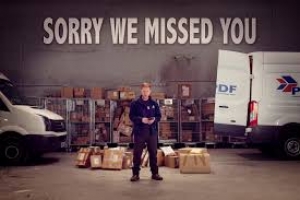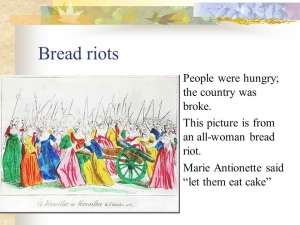
Ken Loach's Sorry We Missed You: the gig economy as agony, not freedom
From Cannes, Dennis Broe reviews Ken Loach’s latest film, about the slow breakdown of a family exposed to the 'freedom' of the gig economy
The first scene of Ken Loach’s new film Sorry We Missed You, which premiered at Cannes this week, is a masterful laying out of the job requirements by a burly foreman. That terminology has changed, however, and now he is simply an ever more impersonal “manager” (which makes him even more a bully) of a down-on-his-luck worker who has, like Richard Kimble in The Fugitive, toiled at many jobs.
The worker recites a litany of part-time work – hauler, builder, even gravedigger – that he has done in trying to stay afloat and the burly company front man assures him that his troubles are over. Now his hours are his, because he is a franchise owner of a delivery van, and the sky and his own ambition are the limit on the amount of money he can make.
The rest of the film is an exposure of this lie – of the desperate condition of a husband and wife and their son and daughter, caught in the agony of this new version of “freedom” which is in some ways much closer to a form of slavery. Ricky is forced to sell his wife Abby’s car to buy the delivery van and the required to work 14 hours a day 6 days a week to meet the company’s demands.

Just as with workers in the Amazon warehouses, Ricky is given a bottle to urinate in by a fellow driver and told that this is his most precious work tool, since he does not have time to stop for a bathroom break. Abby meanwhile, a care worker for the elderly, on a “zero-hour” contract which means she is only paid for the actual time, usually not enough to do the job, that she is allotted to the “client,” itself a term which attempts to distance her from the desperate aged people she is committed to helping.
All expenses and any damages for both workers are of course theirs to repay, and Ricky is told that his most valuable possession is the black box which orders him around and tracks his every movement. He becomes the servant of these algorithms which treat him not as a human being, but as a replaceable cog who does their bidding. As Shoshana Zuboff describes this condition in Surveillance Capitalism, he is caught in a digital profit system that “has no appetite for our grief, pain, or terror, although it eagerly leeches from our anguish”; a system that is “indifferent to our meanings and motives.”
This is a film by Loach and perennial screenwriter Paul Laverty on an extremely topical subject. A British court last year laughed Uber out of the courtroom when it tried to claim that it was not a company employing workers but rather simply a clearing house. The judge called out the digital charade, and told them they behaved exactly like owners but without having to pay any benefits. In the US on the other hand, a judge recently reaffirmed the position of a gig economy company as simply a clearing house, so the matter is extremely contentious at the moment.
Like Loach’s last film, the Cannes prizewinner Daniel Blake, the film is set in Newcastle, once the heart of the British industrial revolution, and the capital of coal, as signified in the British idiom about it being pointless to “carry coals to Newcastle.” But the Newcastle of the last two films by Loach and Laverty is a devastated place, left for dead in the Thatcher revolution which drained the area of its factories. But as one of Abby’s “clients” reveals, it was also one of the sites of a magnificent last-ditch effort in 1984 by the miners to keep their jobs.

A recounting of Loach’s and Laverty’s films over the last more than 15 years at the height of neoliberalism displays this downward trend for the British, and indeed the Western, working class. 2002’s Bread and Roses detailed the ultimately winning efforts of Los Angeles, heavily-female, Latino janitors to organize and unionize. But the highly underrated and more relevant everyday It’s A Free World in 2007 instead presented the opposite scenario, as two working-class female “entrepreneurs” attempted to turn their back on any class solidarity, and instead become exploiters of itinerant African labour, only to fall victim themselves to exploitation from above.
In the world of Sorry We Missed You, the title itself is not just the note the driver leaves if he cannot make a delivery, but also, in the wider sense, a sign of workers passing in the night, trying to maintain a semblance of fellow feeling but driven to distraction as they attempt to merely survive. Abby is consoled by a woman at a bus station who offers her comfort that she barely has time to accept, and Ricky engages in good-natured banter with his working-class customers, but the exchange is always short-lived, cut-off by the pressure to get onto the next delivery.

Like the Latina women of Bread and Roses who clean downtown LA business offices at night, Ricky and his ilk, the other drivers, are supposed to be invisible automatons who simply carry out the imperatives of the new digital economy, while actually being crucial to it. Shooting the film from their perspective therefore becomes a scintillating act that calls the nature of this economy into question.
The film is also clear about the other problem, besides precarity, pressure at work and low wages that plagues these workers, and that is the increasing price of housing. Ricky and Abby nearly had enough money to buy a house in 2008, but then had their loan squashed in the market crash. The hope of buying a home is what drives Ricky to the delivery job. It is this pressure and the inability to own a home that makes workers susceptible to the growing exploitation of the gig economy. Loach often uses a fade to black to end his scenes and in the latest film the black or bleak lasts longer before the next scene begins – a sign of the deepening loss of agency and even hope in his protagonists.
The casting adds an autobiographical and real element to the film’s texture. Kris Hitchen, the poor man’s Damian Lewis (who is squandering his talent on 1% drivel like the TV series Billions, sometimes referred to as ‘wealth porn”) described himself at the press conference after the film as a part-time electrician, part-time actor and thus himself susceptible to precarity in two professions. He comes from Manchester, not Newcastle, and the rivalry between the two cities in soccer figures in a lively debate between Ricky and a customer. Debbie Honeywood, Abby, worked in education for 20 years, itself a caregiving profession that is also being stretched to the limits.

Loach and Laverty were lively and engaged at the press conference for the film, which took place in what for Loach is the very friendly confines of Cannes, where he is the director with the most appearances in the competition. A Reuters reporter, echoing the neoliberal mainstream media soundbite, asked what are we to do in this time where the centre has broken down and there is only the radical right and the radical left. Loach responded by asking who in the room was part of the “radical left.” No one raised their hand and the question was a clever way of calling attention to the fact that anyone outside the new business ethos is labelled “radical.”
The term is also a way of tarring those who want progressive social change by grouping them with the immigrant-hating, actually pro-business nationalists of Nigel Farage and Marine Le Pen. Laverty pointed out that with the growing disparity in income between the wealthiest 1 percent (or fraction of a percent) and everyone else has come an overall decline in life expectancy in many of the Western countries ,and in the US for the first time in almost a century.
Loach pointed to the British Labour Party under Jeremy Corbyn as a potential hope, citing the fact that the ever-growing membership made it the second largest party in Europe but also cautioning the audience that if they opposed the contemporary corporate “consensus” they will be attacked in ways that often have nothing to do with the argument, since the argument for equality is irrefutable.
To return to the film, one of the most impressive aspects of Loach and Laverty’s films is the way they avoid the standard melodramatic turn. Thus, Ricky announces in the opening interview that he has a 100 percent safe driving record and so we wait for the inevitable car crash to come. Except it doesn’t. There is instead a moment where he is so exhausted from driving that he nods off but the truck glides to the side of the road.

Instead, what we witness at the end is the increasing tension in his face and sheer exhaustion from he and Abby trying to support a family which is constantly threatening to come apart, because of their inability to be around to raise their kids. It is not the melodramatic turn of the horrible and disfiguring accident that marks Ricky’s slide into oblivion. It is the slow and increasing tension and weight of the everyday struggle within this supposedly free economy that is the ultimate and most often silent tragedy that these left-behind workers face. Death, and the death of the soul, comes not suddenly and dramatically in Loach’s film but just as inevitably by a thousand cuts every day.





